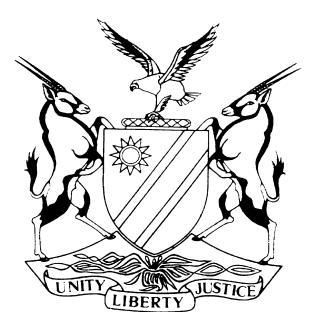1
NOT REPORTABLE

HIGH COURT OF NAMIBIA MAIN DIVISION, WINDHOEK
REVIEW JUDGMENT
CR No: 5/2017
THE STATE
versus
STEFANUS HUMPRIES ACCUSED
(HIGH COURT MAIN DIVISION REVIEW REF NO. 1629/2016)
(MAGISTRATE’S SERIAL NO. 98/2016)
Neutral citation: S v Humpries (CR 5/2017) [2017] NAHCMD 10 (23 January 2017)
Coram: LIEBENBERG J and SHIVUTE J
Delivered: 23 January 2017

ORDER

The accused's conviction of the crime of assault with intent to do grievous bodily harm and the sentence of N$3000 or eight months' imprisonment are set aside.
The case is remitted to the magistrate and he is directed to properly apply the provisions of s 112(1) (b) of the Criminal Procedure Act, 1977, and to, thereafter, dispose of the matter in accordance with the law.
The magistrate is further directed, in the event of the accused's conviction, to sentence the accused with due regard to any period of imprisonment already served by the accused.

REVIEW JUDGMENT

SHIVUTE J ( LIEBENBERG J concurring):
[1] The accused was convicted of assault with intent to do grievous bodily harm, read with the provisions of the Combatting of Domestic Violence Act, 4 of 2003. The accused was then sentenced to a fine of N$3000 (three thousand Namibian Dollars) or 8 months’ imprisonment.
[2] I directed the following query:
‘1. The accused was convicted of assault with intent to do grievous bodily harm after he pleaded guilty and the court invoked the provisions of s 112 (1) (b) of the Criminal Procedure Act 51 of 1977.
2. How did the court satisfy itself that the accused admitted all the allegations if there were no questions pertaining to unlawfulness asked?’
[3] The learned magistrate replied:
‘The learned Reviewing Judge is correct: the record is silent on whether the court put the question as regards unlawfulness to the accused which is an anomaly. It is highly likely that the question was put to the accused but not recorded.
That said, in retrospect, this matter could have been dealt with under section 112 (1) (a) of the CPA in light of the fact that the complainant did not sustain serious injuries. I, however, leave it in the hands of the Learned Judge to decide how to dispose of this matter going forward. Suffices to say that the honourable judge should keep in mind that the accused is a sentenced prisoner since he did not pay the fine. And that should the matter be remitted to this court for questioning: the result will most likely be the same as regards the conviction and sentence.’
[4] Section 112 (1) (b) of Act 51 of 1977 questioning has a twofold purpose namely: to establish the factual basis of the plea of guilty and to establish the legal basis for such plea. From the admissions the court establishes whether the legal requirements for the commission of the offence have been met. These include questions of unlawfulness, actus reus and mens rea. The court can only satisfy itself if all the elements of the offence are adequately covered through the admissions.
[5] Moreover, the fact that the accused was involved in a fight with the complainant necessitated further questioning on the element of unlawfulness.
[6] In the case of S v THOMAS 2006 (1) NR 83 (HC), the court stated that:
‘A failure to comply with the peremptory provisions of s 112(1)(b) does not simply constitute non-compliance with the law, because any conviction that follows without such non-compliance can certainly not be regarded as being 'in accordance with justice'. Unless the accused has admitted to all the elements of the offence, he or she may not be convicted merely on account of his or her plea - except, of course, in the case where s 112(1)(a) applies. To disregard the requirements of this section would jeopardise especially those accused who are unrepresented or illiterate. Justice requires that only persons who are guilty of a particular crime should be convicted. To apply or interpret s 112(1) (b) otherwise would not accord with justice.’
[7] In the result, the following order is made:
The accused's conviction of the crime of assault with intent to do grievous bodily harm and the sentence of N$3000 or eight months' imprisonment are set aside.
The case is remitted to the magistrate and he is directed to properly apply the provisions of s 112(1) (b) of the Criminal Procedure Act, 1977, and to, thereafter, dispose of the matter in accordance with the law.
The magistrate is further directed, in the event of the accused's conviction, to sentence the accused with due regard to any period of imprisonment already served by the accused.
________________________
N N Shivute
Judge
______________________
JC Liebenberg
Judge